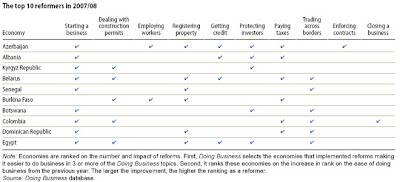The IFC and WB have just published an annual report on the ease of doing business in countries around the world. The report, which is widely covered in the media and is taken as one of the tools to gauge investment and business climate in a country, states that the top ten reformers in 2007/08 are: Azerbaija, Albania, Kyrgyz Republic, Belarus, Senegal, Burkina Faso, Botswana, Colombia, Dominican Republic, and Egypt. It tracks ten stages in the "lifecycle of a business" and ranks countries on their regulatory ease of doing business. Here is the report overview.
The indicators used in the report are: starting a business, dealing with construction permits, employing workers, registering property, getting credit, protecting investors, paying taxes, trading across borders, enforcing contracts, and closing a business. The rankings do
not reflect such areas as macroeconomic policy, quality of infrastructure, currency volatility, investor perceptions, or crime rates.
Singapore leads the global rankings on the overall regulatory ease of doing business for a third consecutive year. New Zealand is runner-up, and the United States third. Bahrain and Mauritius join the ranks of the top 25 this year.
The top 25 are, in order, Singapore, New Zealand, the United States, Hong Kong (China), Denmark, the United Kingdom, Ireland, Canada, Australia, Norway, Iceland, Japan, Thailand, Finland, Georgia, Saudi Arabia, Sweden, Bahrain, Belgium, Malaysia, Switzerland, Estonia, Korea, Mauritius, and Germany.
Sadly, the report states that "no major reforms were recorded." Nepal rank is 121 on the list. In South Asia, Maldives has the highest ranking (69), followed by Pakistan (77), Sri Lanka (102), Bangladesh (110), Nepal (121), India (122), Bhutan (124), and Afghanistan (162).
I will have more on the ease of doing business in Nepal and in South Asia discussion in later posts.
I am getting late for class now!
